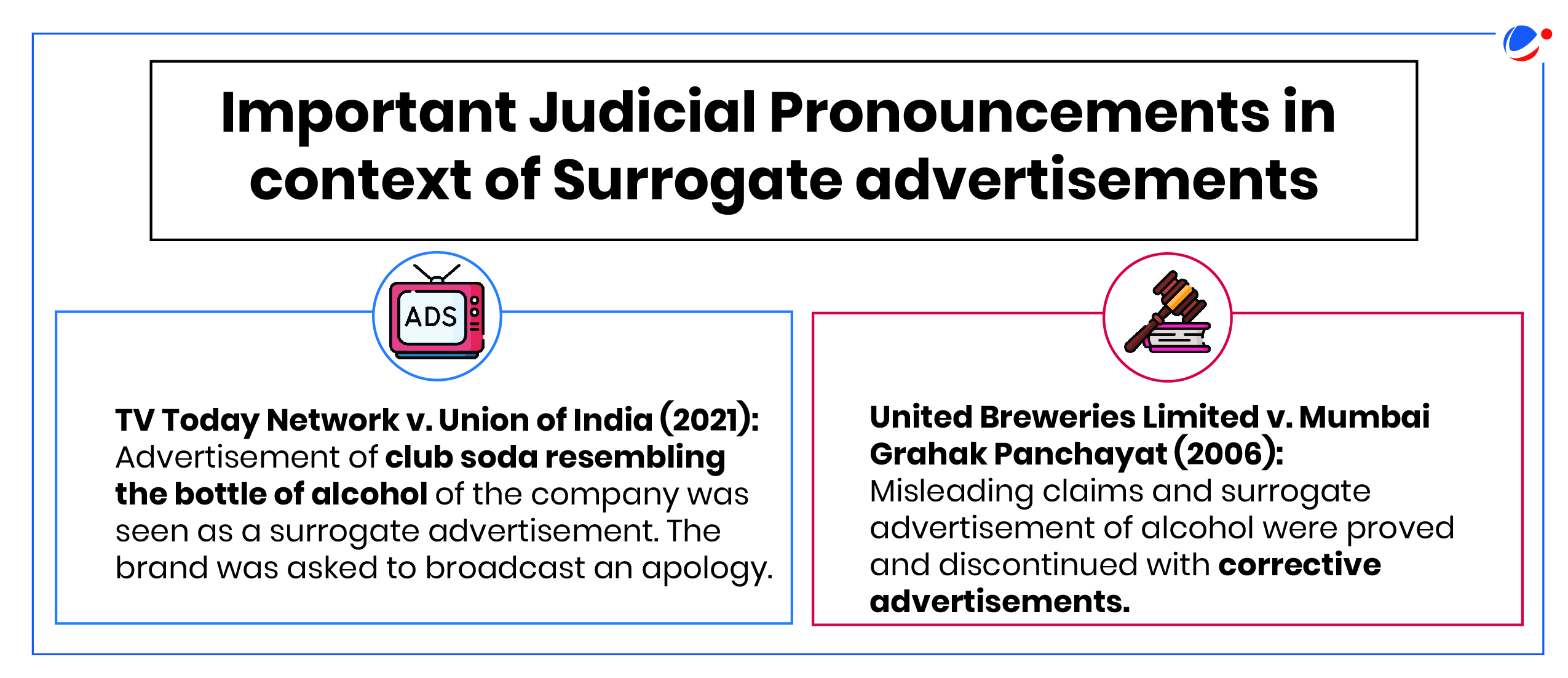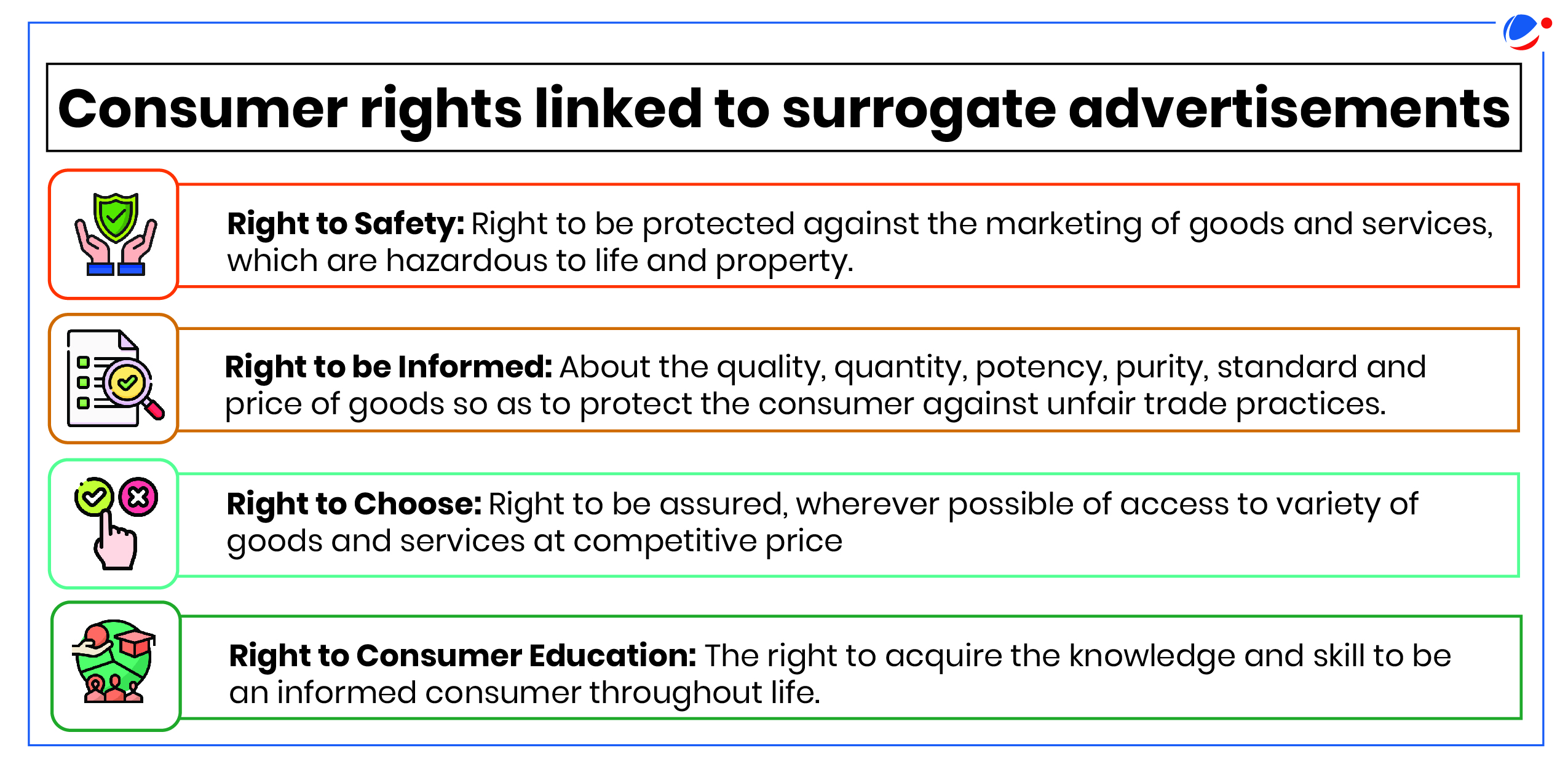Why in the News?
Ministry of Health and Family Welfare recently asked Sports Authority of India and BCCI to take measures to prevent surrogate advertisement of tobacco/alcohol by sportspersons.
More on the News
- The Ministry had listed out measures including:
- signing an anti-tobacco declaration of interest form,
- not promoting/advertising in stadiums or events hosted or partnered by BCCI,
- issuing directives to sportspersons under BCCI's ambit to refrain from surrogate promotion/advertisement of tobacco and related products.
- It also requested not to allow such surrogate advertisements by other celebrities in sporting events of the BCCI, such as the IPL.
About Surrogate advertisements
- They are essentially a substitute advertisement for the goods which cannot be directly advertised due to the prohibition of law.
- E.g. Tobacco products, alcohol etc.
- It includes false description, guarantees, misleading implied representation, deliberately concealing essential information leading to unfair trade practices.
- These advertisements in popular sporting events help the brands gain recall value, which increases the sales of prohibited products.
- E.g. Pan masala products contributed 16% of ad volumes during IPL 2024.
- Brands use methods like roping in celebrities, aspirational locations and visuals to attract customers.
- E.g. Liquor companies advertising Music CDs or surrogate promotion of pan masalas by promoting silver-coated cardamom, areca nut.
Legal framework related to Surrogate advertisements
- Cable Television Networks (Regulation) Act, 1995 with Cable Television Rules, 1994, and the Cigarettes and Other Tobacco Products Act (COTPA), 2003 banned direct or indirect promotion, sale or consumption of liquor, tobacco and cigarette advertisements.
- Central Consumer Protection Authority (CCPA) Guidelines for Prevention of Misleading Advertisements and Endorsements for Misleading Advertisements, 2022 defined surrogate advertisement for the first time.
- Consumer Protection Act, 2019 defines 'misleading advertisements' as an advertisement which falsely describes; or mislead the consumers of such product or service.
- Advertising Standards Council of India (ASCI) Code allows use of a brand associated with a restricted good to be used for advertising unrestricted goods in case it is a 'genuine brand extension'.
- Genuine brand extension is determined by gauging the proportionality of the scale of advertisement with the production and sale of the unrestricted good.

Implications of Surrogate Advertising
- Consumers
- Undermine Consumer rights: Surrogate advertising results in unfair trade practices and violates consumers' right to information and choice.
- Undermine conscious decision-making: The ads are formulated to sell dreams through aspirational content linking it with the product. This misleads the vulnerable sections like youth and the poor.
- Public Health:
- Public health hazards: negative impact on health by making tobacco and alcohol products attractive to consumers which may cause addiction especially in the youth.
- An ICMR study found that surrogate Smokeless Tobacco brands dominated 41.3% of total advertisements in the ICC Men's Cricket World Cup 2023.
- Companies
- Profitability vs. efficacy: Surrogate ads improve brand visibility and sales of prohibited products, encouraging further use of unfair trade practices.
- A 2019 survey claimed that over 70% consumers were influence by surrogate ads.
- Digital streaming platforms, BCCI, and State Associations see significant revenue boosts from surrogate advertisements during sports tournaments. E.g. Brands pay ₹ 60 lakh for a 10-second ad spot.
- Profitability vs. efficacy: Surrogate ads improve brand visibility and sales of prohibited products, encouraging further use of unfair trade practices.
- Ethical implications
- Lack of transparency and accountability: This encourages brands to exploit the legal loopholes to promote prohibited products through advertisements.
- Social influence and nudge theory: The use of 'out of sight- out of mind' marketing strategy nudges consumers to consume tobacco or alcohol products. E.g. Celebrity endorsements.

Issues in regulation of surrogate advertisements
- Loopholes in legislations: Weak legislations with vague definitions and conditions make them open to interpretation.
- Ineffective implementation of laws and lack of actionable accountability, giving a free pass to brands.
- Unethical practices: Concerns over potential use of unethical practices or price reduction by companies to gain market share, creating risk of even greater consumption from people.
- Lack of stringent punishment: Punishments are usually publishing corrective advertisements and lack proportionate penalties.
- Loss of Jobs and Revenue: As the production and high taxes/cess on sin goods (e.g. liquor and tobacco) contribute significantly to job creation and state revenue.
Way forward
- The Stakeholder Consultation meeting between Government stakeholders and ASCI highlighted the steps to be taken:
- Ensure clear distinction between the brand extension and the restricted product or service being advertised
- The ad should not make any direct or indirect reference to the prohibited product.
- The ad must not have resemblance in presentation with the prohibited product.
- The ad must not use situations typical for promotion of prohibited products when advertising the other products.
- Enhancing current regulations and closing loopholes:
- COTPA and ASCI clarifications: Define the ban on surrogate advertising explicitly and extend the same to all media, events and sports sponsorships.
- Digital media regulations: Digital platforms can come under the purview of regular regulations-the initial focus could be on sports betting, health-centric supplements, and gym-related products.
- Ensuring accountability: Increase penalties and make media corporations liable through fines and promote responsible advertising practices.
- Regulatory insight: Ensure periodic audits, real-time vigilance and strengthening enforcement mechanisms.
- Boost public awareness and education through Information, Education, and Communication (IEC) campaigns etc.
Conclusion
Advertisements have a strong influence in the minds of consumers especially in this era of new age technology. It is vital to ensure legitimacy of their claims to ensure a healthy society.





